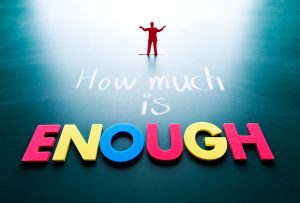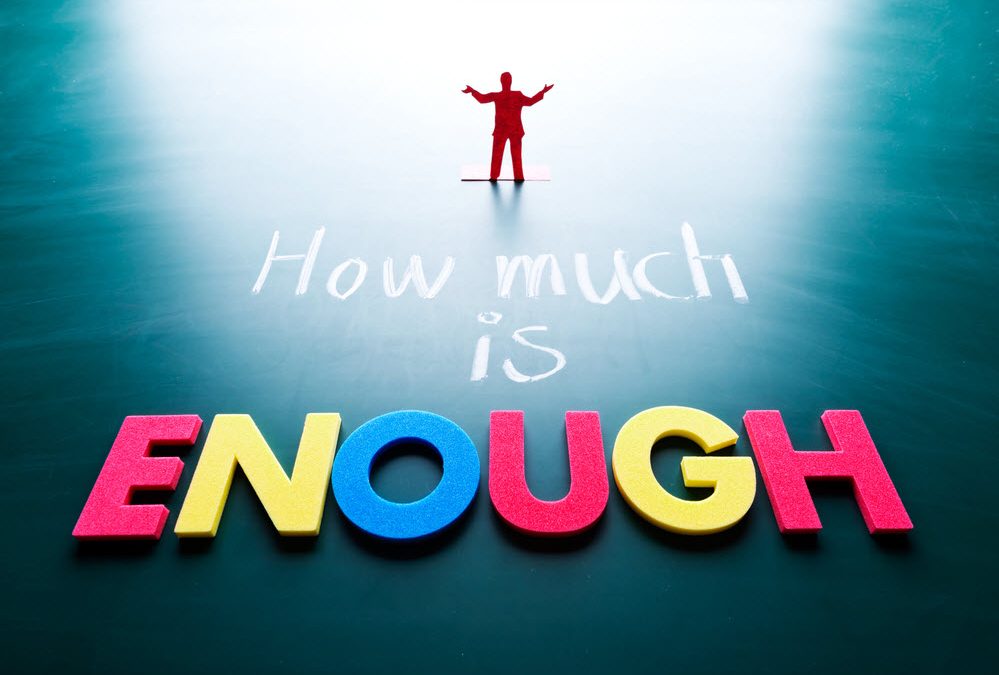How Much Is Enough?
How Much Is Enough?

 About 20 years ago, I had a wealthy client who was generating more than $1 million a year in income from various businesses that he owned. For the purpose of this discussion, I’m going to call my client “Jim.” In one of his businesses, Jim had a partner who got upset and cut off all contact with Jim and changed the locks and took control of the building where the business was located.
About 20 years ago, I had a wealthy client who was generating more than $1 million a year in income from various businesses that he owned. For the purpose of this discussion, I’m going to call my client “Jim.” In one of his businesses, Jim had a partner who got upset and cut off all contact with Jim and changed the locks and took control of the building where the business was located.
Jim ended up filing a lawsuit against his partner, which caused several of the partner’s family members to accuse Jim of being heartless and greedy. The most common complaint that filtered back to Jim was, “How much money does Jim need? Doesn’t he have enough money?”
At the time of the dispute, I had known Jim for more than 15 years. Contrary to what his partner’s family members were saying, Jim was a very generous man who gave a lot of money to charity and was always willing to come to the aid of people who were in need.
Last week, I emphasized the importance of developing a clear understanding of what I call the language of money, which includes the true meaning of the words “rich” and “accumulate.” Those words must be clearly defined in our minds, so we can work on overcoming any conditioned beliefs and subconscious barriers that hold us back from maximizing the amount of money we earn, save, and invest.
There’s one more word that I need to discuss before we can move on. That particular word is “enough.”
So here’s the question that needs to be answered: “How much money is enough?”
How much accumulated wealth would you say is “enough” for a person? Do you have an amount in mind? If not, before you read any further, think about it and decide how much money you think is an appropriate amount to have in savings and investments. After you decide on the amount, would you be willing to admit that if you acquire $100 dollars more that amount, you have passed the point of “enough”?
In order to properly answer the question of how much is enough, I need to review a story from the Old Testament. It’s an important story, so stick with me.
The story is about Joseph, who was hated and envied by his brothers because he was the favorite son of his father, Jacob. Joseph’s brothers sold him into slavery and he later ended up in Egypt where he was called upon to interpret a pair of dreams for Pharaoh.
Joseph’s interpretation of the dreams was that Egypt was going to experience seven years of abundance, followed by seven years of famine. After hearing Joseph’s interpretation, Pharaoh put Joseph in charge of storing up enough grain during the seven years of abundance to take care of Egypt during the seven years of famine.
Why is this story important? Because from a biblical and historical standpoint, the lesson from the story is that you should keep in mind that if all the income you receive from your earnings and investments were to totally dry up, you would be wise and prudent to plan on having enough accumulated assets to provide for the support of your family for seven years, without the need to earn any income during those years.
Just to be clear, the seven years of accumulated assets would need to be “stored up” and are in addition to the income that you currently earn from your job and investments. As long as your job and/or investments are generating income, you have no need to dip into your accumulated assets.
I shouldn’t have to tell you, but in addition to having the accumulated assets to cover the seven years, you cannot have any debt.
Once you get to the point where you have met my seven year “enough” strategy, you have reached what is called a “safe harbor” position.
The best thing about reaching a safe harbor position is that you are able to bypass all the negative beliefs about money that came from the money conditioning you received while you were growing up. A plan to have ongoing income based on work and investments, along with enough accumulated assets to cover seven years of living expenses, is eminently reasonable.
With this plan, there are no fears about being too rich to “pass through the eye of a needle,” and there are no concerns that you are being avaricious or greedy. Any rational person would be able to justify a financial plan that guarantees the financial security of their family by achieving and maintaining a safe harbor position.
By the way, when you reach your safe harbor position, you will possess the knowledge, skills, and confidence to continue to increase your income and acquire new assets, so you can pass your additional income and assets along to your family members and to the people and institutions that are in need of your assistance.
You may disagree with me that seven years of accumulated wealth is acceptable, prudent, and reasonable. If that’s what you believe, then my question for you is, How many years of accumulated wealth and assets do you believe is reasonable?
Whatever your answer to my question is, it’s going to be different from the answer given by every other Catholic I ask. The reason for this is that your definition of the word “rich” and “enough” is going to be based on your own personal beliefs about money. And where did those beliefs come from?
Because we were all born as a blank slate — with no knowledge or experience — all the beliefs we possess were at one time or another constructed in our minds and eventually accepted by us as true. Most of our beliefs about money were formed and constructed automatically and unconsciously as a result of what we were exposed to while we were growing up.
At a silent men’s retreat that I attended during the 1990s, one of the men at the retreat asked the retreat master, Fr. John A. Hardon, this question: “How much wealth are we allowed to accumulate before we are in danger of losing our souls?”
Fr. Hardon hesitated and then responded, “I can say with certainty that it is impossible for a billionaire to get into heaven.” He then went on to tell us about how he had provided spiritual direction to a billionaire and had convinced him to sell his fleet of jets and use the proceeds from the sale to help the poor and to teach others about the Catholic faith.
After stating that it is impossible for a billionaire to get into heaven, Fr. Hardon added that a person who is worth $1 billion or more has no need for God. He can buy anything he wants, any time he wants. Besides goods and services, his purchases can also include influence and power.
We are expected to use our talents, abilities, and skills to do everything we can to serve God and our families, and to assist others to the best of our ability. After that, we are expected to trust that God will provide for all of our other needs.
We have no issue with purchasing whatever we need to get through the winter. If we were to simply say, “I don’t need boots, a coat, gloves, and a hat to get through the winter because I know God will provide for me,” we would be foolish.
By the same token, in the chaotic and uncertain world that we live in, it would be foolish for us fail to acquire and accumulate enough food and money to take care of our families in the event that there is an economic collapse that results in the type of “famine” that we have never seen or experienced. Unfortunately, we do not have a Joseph who can interpret a King’s dreams and then tell us what we need to do to prepare for our future.
It’s up to us to use the intelligence and wisdom that God gave us to come up with a plan for protecting our families. After we do that, we need to trust that God will continue to take care of the rest of our needs.



